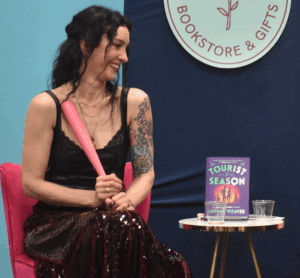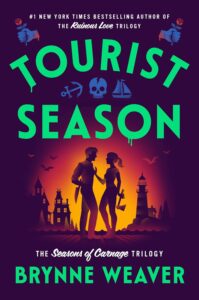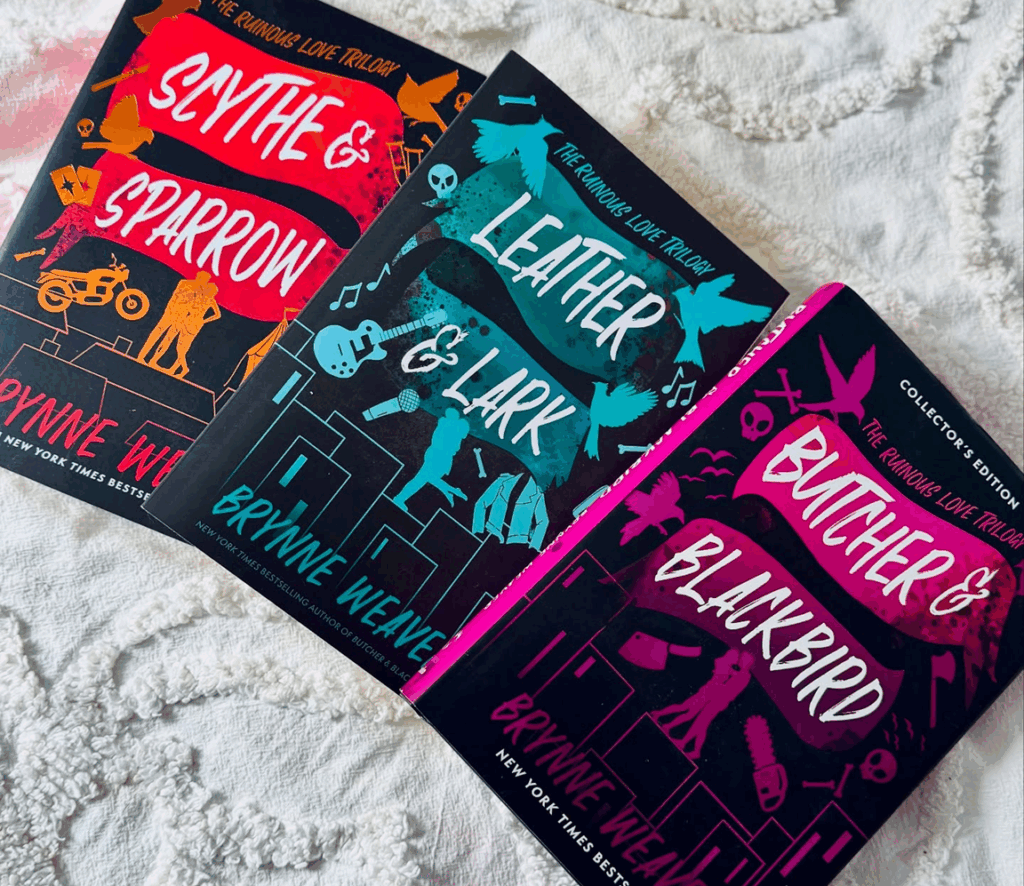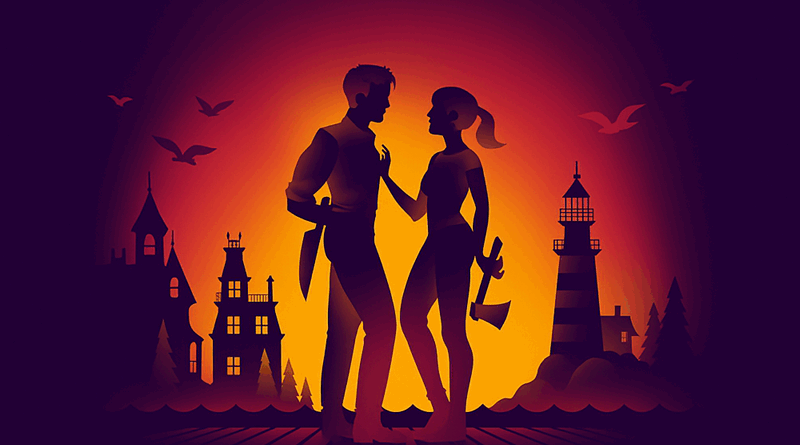Premium Ballmeat: A review of Brynne Weaver’s Tourist Season
Over the last few years, dark romance has become a popular genre. It has all the aspects of a thriller novel with the guaranteed happy ending of a romance. This genre allows readers a safe place to explore things that are morally reprehensible, including murder, rape, torture, and violence. It has also become a spot for people to explore kink without having to put their trust in someone, something vitally important in kinkplay. Many dark romance authors will take this premise and ignore the fact that romance requires happy endings. Authors like HD Carlton and WWillows often romanticize abuse by writing about victims who, for reasons unknown even after reading the books, will fall in love with men who beat, starve, isolate, and rape them. Their female leads must learn to love the darkness in their male counterparts in a bid for survival, and because they end up together, this is considered a romance.

Brynne Weaver takes a different approach to writing dark romance than her contemporaries. First, she involves a lot of humor in her dark romances, putting her characters in outrageous situations that play with situational irony. Everything that is expected is turned on its head for comedic effect. Whenever readers expect the main characters to be caught in their murders, the incompetence of cops or the inexperience of those who catch them allow their crimes to stay secret. In addition to the use of comedy, Weaver’s characters are complicated. They are dark. They are morally gray people at best who murder, manipulate, and destroy others, not their romantic interests.
To make these objectively bad people sympathetic or interesting, Weaver, like the writers of Dexter before her, often relies on the horror of sexual assault to create murderers you root for. In her previous series, The Ruinous Love Trilogy which takes place in the same universe as Tourist Season, she did this by making the lead characters survivors of domestic or sexual abuse. The protagonists only target people who deserve it, which tends to mean abusers: Parents who beat their children or sexual assaulters. By making these people the victims of the killers, Weaver gives her readers the escapist fantasy of revenge. She does the same in the first book of this new series. Harper, Tourist Season’s female lead, is hiding from her past in the small town of Carnage, which she’s determined to protect at all costs. Nolan, the male lead, has spent the last five years hunting down the perpetrators of a hit-and-run that left him disabled and killed his brother. Harper is Nolan’s final prize: The driver who left him behind — except she’s nothing he expected. As he gets to know Harper, Nolan’s plan of adding her to his scrapbook of kills grows shaky.

Where other writers shy away from making their female leads dangerous, this is Brynne Weaver’s bread and butter. Her main female leads are as toxic and manipulative as their male counterparts, if not more so. Every female main character she’s written so far is a serial killer, and Tourist Season is no different. From the beginning of the book, readers know that Harper is keeping secrets, both from us and from Nolan. These secrets can and do impact the whole story. If she had exposed her real identity when Nolan first confronted her, Nolan would have stopped hunting her, and the book itself would have ended after a grand total of 50 pages. Like Sloane, Lark, and Rose in The Ruinous Love Trilogy, Harper finds pleasure in delivering violent vigilante justice. Nolan is amused by her monstrosity without ever excusing it. Although he too is a serial killer, readers only learn about his murders in the aftermath or through vague memory; we get to experience Harper’s. By describing Harper’s crimes and her willingness to commit them, Weaver is unexpectedly feminist. She gives Harper the freedom to be terrible and ugly, something rarely afforded to female leads in this genre.
Tourist Season turns many romantic tropes on their heads. In many romance novels, the male lead has to save the female lead; this happens in Ali Hazelwood’s Below Zero, Mia Sheridan’s All the Little Raindrops, and Alicia Thompson’s Never Been Shipped, to name a few. However, in Tourist Season, Harper isn’t the damsel in distress. She doesn’t have to rely on a man to protect her because she’s more than capable of doing the job herself. When Nolan is kidnapped due to his relationship with Harper, she ends up saving him. Romance is also well known for its grumpy/sunshine trope, with the male lead being grumpy and the female lead providing sunshine. Tourist Season has the same trope with one distinction: Harper is grumpy, Nolan is sunshine. Women are rarely cast as the grumpy character and men are never given the freedom to just be happy. Tourist Season even has a meet-cute. While Harper is transporting the various body parts of her most recent victim, she and Nolan meet at a coffee shop where they’re both struck dumb by the other. Struggling for conversation, Nolan asks her what she has in her hands — the metal inserts in a victim’s body that Cookie Monster the woodchipper just could not shred —and, nervous, she answers, “Ballmeat.” It’s a running joke throughout the novel after that. Harper has a crude sense of humor that would never exist in the female leads of other romance novels.
Despite its dark and silly premise, this novel tackles many other sober topics within its pages. She makes her characters sympathetic through more than their choice in victims. Harper cares deeply about her town, which is constantly disrupted by tourist season and its monetary impacts. She is the caregiver for her elderly mentor — surprise surprise, another serial killer — who can barely remember her. Nolan struggles with being recently disabled and the grief of losing his brother. This combination of issues allows even more empathy to build for our lead murderers, making us root for them. These difficulties also help readers explore what may lead someone to committing these crimes.
Media that casts murderers as protagonists always forces the readers to ask themselves what would justify a murder. Weaver is skilled at finding those justifications. However, throughout this novel, she also forces readers to come face to face with the idea that, regardless of their reasons, these murderers could be wrong. Arthur finds questionable reasons to murder people because, as he ages, his justifications become weaker. Nolan eventually realizes that he wrongly targeted Harper in his murder spree — she wasn’t even in the car that disabled him. This is new for Weaver; in her previous works, her serial killers were the unquestioned arbiters of right and wrong. It adds unreliability to her main characters that makes her writing more interesting.

Weaver’s work with characterization is unrivalled; Tourist Season shows this in its best form. Her plotting, though, is a little repetitive. Tourist Season reuses situations from Weaver’s previous works. This is not the first peeping tom murdered by a male lead; that honor goes to Rowan in Butcher & Blackbird. This is not the first time a serial killer has made art out of their victims; Lark created sculptures in Leather & Lark. This is not the first time an abuser of hospital staff has been murdered; Rose did that in Scythe & Sparrow. Sloane of Butcher & Blackbird has inspired two different characters to start their own serial killer careers, Lark and Harper. Without spoiling any of the books too severely, Weaver has also included an unexpected and supposedly cognitively incompetent series antagonist before.
Nolan and Harper are also overwhelmingly obsessed with their own darkness. They constantly comment on how they find their own crimes unacceptable, but without introspection find the darkness in their partners attractive. They never consider stopping their murder spree, though they clearly have moral quandaries with what they do. Both are constantly mentioning their “darkness,” which they always refer to as such, and having grand monologues about how they fit into the world. Weaver can’t decide how her characters see themselves: Righteous or reprehensible? It’s enough to make a reader snort at the characters’ self-importance.
For all the failures in her work that make it just a bit campy, Weaver’s Tourist Season is a strong start to a new series. The characters in this book feel distinct from those in her previous series. The questions of morality are incredibly interesting. The secrets kept set up the next novel well. The romance between Nolan and Harper is interesting. The comedy is almost slapstick. I’m excited for the next installment in Seasons of Carnage.

